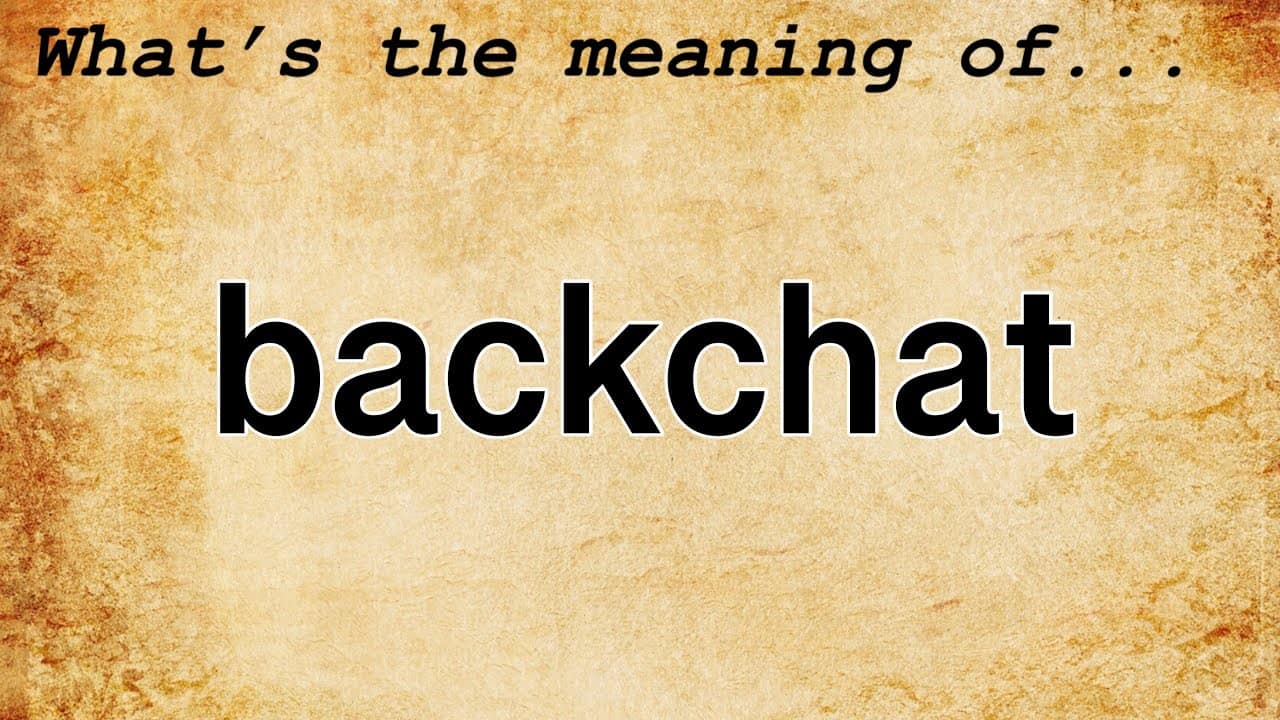Understanding Backchat: Navigating Your Child’s Sassy Responses with Grace
Welcome, parents! If you’ve ever found yourself puzzled, frustrated, or simply curious about your child’s quippy comebacks, you’re certainly not alone. Often, those little remarks, known as backchat, can hit a nerve, but fear not! We’re here to help you understand the meaning of backchat, why children might do it, and most importantly, how to handle it with positivity and poise. So, buckle up, and let’s turn those sassy moments into effective communication opportunities!
What Exactly Is Backchat?
Before we dive into the deep end, let’s get clear on the term itself. Backchat refers to those cheeky or disrespectful retorts that children sometimes give to adults. It’s the sass, the backtalk, the smart-alecky replies that can catch us off guard. While it might be tempting to dismiss these as mere child’s play, understanding the underlying causes of backchat is essential for managing it effectively.
Why Do Children Backchat?
There are numerous reasons why a child might backchat. Sometimes, it can be a phase or a way of testing boundaries. Other times, it might be a sign of deeper issues such as stress, a cry for attention, or a struggle to express their feelings appropriately. Facing these smart-mouthed moments with empathy is key to guiding our children toward better communication habits.
Identifying the Triggers
Start by pinpointing what sets off the backchat. Is it during the morning rush to school? In the midst of homework time? Or perhaps when you’re discussing bedtime? By recognizing the triggers, you can better prepare yourself to handle the situation calmly and effectively.
Effective Strategies for Dealing with Backchat
Now that we’ve unraveled the meaning and causes of backchat, let’s equip ourselves with strategies to turn those challenging interactions around:
- Keep Your Cool: Respond to backchat with a level head. Instead of snapping back or escalating the situation, take a deep breath and maintain your composure.
- Clear Communication: Sometimes, all it takes is clear and consistent communication about expectations and the consequences of rude behavior.
- Setting Boundaries: Clear boundaries are important in any parent-child relationship. Discuss and enforce limits to ensure your child knows what’s acceptable and what’s not.
- Positive Reinforcement: When your child communicates well, make it a point to acknowledge and praise them for it. Positive reinforcement goes a long way in encouraging good behavior.
Remember, your approach to backchat can transform it from a point of contention to a teachable moment. By staying calm, speaking your peace, setting clear expectations, and reinforcing good communication, you’re on your way to managing backchat in a way that builds your child’s emotional intelligence and your relationship.
So, dear parents, let’s approach those sassy comments with a new perspective. With a sprinkle of patience, a dash of understanding, and a spoonful of love, we can guide our children through their backchat phase and beyond. After all, every interaction is an opportunity to teach, learn, and grow—both for you and your little chatterbox. Stay tuned for more insights and tailored advice as we continue to explore the world of parenting together.
Let’s turn the challenge of backchat into a chance to foster respect and nurture the budding personality within your child. Whether through direct communication or creative strategies, we’re here to support you every smart-aleck remark of the way. Happy parenting!

Five Essentials Parents Should Know in Preparing for Backchat
1. Understand the Impact of Developmental Stages
Children’s attitudes and behaviors are largely influenced by their developmental stage. As they grow, they test limits and express their growing independence, which often results in backchat. Knowing that backchat can be a sign of your child’s natural development can help you respond with patience and guide them appropriately.
2. Reflect on Your Own Communication Style
Children learn by example, so it’s crucial to consider how your own communication might influence their behavior. Modeling respectful dialogue and demonstrating how to handle disagreements with grace can have a profound impact on how your child communicates with you and others.
3. Recognize Emotional Undercurrents
Backchat isn’t always just about being cheeky; it’s often a mask for deeper emotions. Whether it’s frustration, confusion, or a need for autonomy, recognizing the emotional undercurrents behind your child’s backchat enables a more empathetic and effective response.
4. Consistency Is Key
When setting boundaries or applying consequences for backchat, consistency is non-negotiable. Inconsistent parenting can confuse children about what is acceptable, leading to more backchat. Stick to your rules, and your child will learn what’s expected of them.
5. Encourage Open Dialogue
Encourage your child to express their thoughts and feelings respectfully. Create an environment where they feel heard and understood. When children know they have a voice, they’re less likely to resort to backchat as a means of being noticed.
Backchat: More Than Just Sass
Backchat is more than a battle of wills; it’s an opportunity to engage with your child and understand what they are trying to communicate. It’s a chance to teach the art of conversation and the power of words. Embrace these moments as part of the parenting journey, and remember, every challenge is also an opportunity to strengthen your bond and to empower your child with the skills they’ll need to navigate the world around them.
By implementing these strategies and maintaining a positive outlook, you’ll help your child develop the communication skills and respect for others that are essential for success throughout life. Transforming backchat into meaningful conversation is an investment in your child’s future—one that will pay dividends in the form of a thoughtful, well-spoken, and confident individual.
Understanding backchat is just the start, but with these five essentials in mind, you’re well on your way to guiding your child through the complexities of growing up in a supportive and nurturing manner. Let’s continue to explore and celebrate each stepping stone in the wonderful world of parenting.
See more great Things to Do with Kids in New Zealand here. For more information see here
Disclaimer
The articles available via our website provide general information only and we strongly urge readers to exercise caution and conduct their own thorough research and fact-checking. The information presented should not be taken as absolute truth, and, to the maximum extent permitted by law, we will not be held liable for any inaccuracies or errors in the content. It is essential for individuals to independently verify and validate the information before making any decisions or taking any actions based on the articles.




